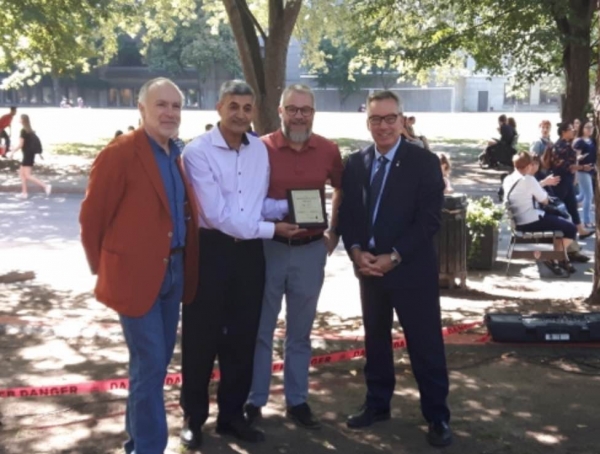The only thing that makes Ebrahim Noroozi salivate more than food is its sustainable practices. As lab supervisor, he clearly takes pride in making his experiments more environmentally friendly. He carries with him a seemingly endless list of the many innovations he has implemented in the Department of Food Science and Agricultural Chemistry, like a badge of honour.
This fall, Noroozi received the inaugural Sustainable Lab Award—the most recent of many formal recognitions for his service to the McGill community.
Amongst nearly 800 research and teaching labs currently operating at McGill, Noroozi’s lab was selected by the McGill Sustainable Labs Working Group for its environmentally-conscious chemical purchasing policy of buying supplies in reduced amounts, its novel system to recover and reuse chemicals, and other uniquely-sustainable lab practices.
The award, presented to a lab which demonstrates “a commitment to integrating environmental, social, and economic considerations into the way they work,” is one of many initiatives proposed in McGill’s Climate and Sustainability Action Plan, a framework to increase the university’s dedication to sustainability.
“Mr. Noroozi has consistently demonstrated the utmost regard for [the] best practices around health, safety and sustainability in the laboratory he operates,” Vice-Principal (VP) of Administration and Finance Yves Beauchamp wrote in a statement to The McGill Tribune. “He goes above and beyond the call of duty by making use of his expertise as a chemist and a safety professional in providing guidance to others in the Faculty around chemical safety, hazardous waste disposal, spill response, and environmental protection in general.”
From eliminating thermometers containing mercury to using small containers to reduce commercial alcohol use, Noroozi’s success is credited to his eye for identifying ways in which the lab can be improved.
In the case of alcohol storage, Noroozi noted that the 200-litre containers they used previously were easily contaminated because of their large size.
“By purchasing smaller, 25-litre containers, the amount of waste product due to cross-contamination [when performing experiments] was drastically decreased,” Noroozi said. “I try to teach students good lab practices, [such as] the difference between which substances are waste and those which are recoverable and can be used again for teaching purposes.”
When students brought to his attention that the rubber lining in one apparatus was wearing down, Noroozi purchased stainless steel ones to replace them. As a more durable material, stainless steel equipment can be used for longer periods of time without needing to be replaced.
Noroozi has also started multiple internal initiatives, including the promotion of sharing chemicals between labs and buying products that meet modern environmental standards.
McGill currently employs ‘lab-packs,’ a series of steel-drums which help to safely dispose of unwanted, dated, or contaminated chemicals. When Noroozi realized the lab-pack system did not account for leftover reusable chemicals, he offered an alternative solution.
“These chemicals are not necessarily bad,” Noroozi said. “[It] could be from a lab which has been retired or from a researcher who had a surplus of one product. Before I get rid of [the chemicals], I let my colleagues know what I have and they can then come and pick-up what [they need].”
Under his leadership, Noroozi estimates the faculty has spent upwards of $100,000 on safety equipment over the last two decades to improve health and safety features across the Macdonald Campus.
“An institution of McGill’s size owes it to the environment to have laboratory practices that are sustainable,” Noroozi said. “Our research has the potential to carry a lot of biological, chemical, and physical harm. If we are careful with the way in which we implement our laboratories, then society can benefit from our research without the imposition of environmental consequences.”








